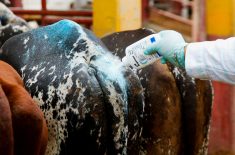Tyson Foods Inc said it halted purchases of slaughter-ready cattle from Canada as of mid-October due to higher costs associated with mandatory country-of-origin (COOL) labeling, a company spokesman said on Thursday.
Tyson, the biggest meat processor in the United States, will continue buying Canadian feeder cattle that are finished for market at U.S. feedlots, Tyson Foods spokesman Worth Sparkman said in an email.
“Like many others in the North American beef industry, we’re very disappointed by the changes made in the U.S. country of origin labeling rules,”
Read Also

U.S. not ready to lift Mexican cattle ban over screwworm, Agriculture Secretary Rollins says
The U.S. is not yet ready to reopen its border to Mexican cattle amid an outbreak of the flesh-eating New World screwworm parasite, Agriculture Secretary Brooke Rollins said, but she is pleased with Mexico’s efforts to contain the pest.
He said COOL significantly increased the company’s costs for additional product codes, production breaks and segregation of product. That product sorting includes a separate category for cattle shipped directly from Canada to U.S. beef plants, Sparkman said.
In early September, a U.S. district judge refused to block the government from requiring labels on packages of beef, pork, poultry and lamb sold in U.S. stores to include more specific information about the meat’s country of origin.
U.S. meat packers asserted that the latest COOL requirements would drive up their costs and make bookkeeping more difficult.
“We remain hopeful that these new rules will eventually be rescinded, and we’ll be able to resume buying cattle directly from Canadian cattle feeders,” Sparkman said.










